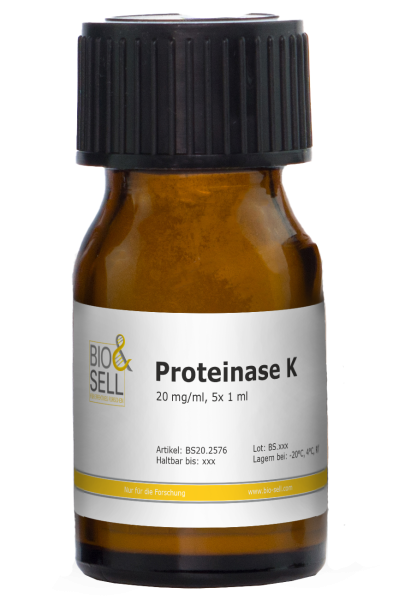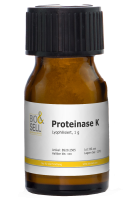Roztwór proteinazy K, 5 ml

Ceny plus VAT plus koszty wysyłki
Czas realizacji zamówienia Ok. 5 dni roboczych
- Article number BS20.2576
Roztwór proteinazy K (5 x 1ml)
20 mg/ml; (w 50mM Tris-HCl (pH 8.0), 1 mM CaCl2, 50 % glicerolu)
Do niezawodnej inaktywacji endogennych nukleaz (DNaz, RNaz) podczas przygotowywania DNA lub RNA. Proteinaza K firmy Bio&SELL jest zarówno bardzo aktywna (aktywność 30 U/mg) jak i stabilna i oczywiście wolna od RNAz, DNAz i egzonukleaz.
Jej aktywność może być inaktywowana przez PMSF.
Zalecane stężenie proteinazy K do użycia to 50 - 100 μg/ml dla większości zastosowań.
Może być stosowana w pH 4,3 - 12; optymalnie w pH 8.
Kategorie: Serin-Endopeptidase (Hydrolase)
EC-Nummer: 3.4.21.64
Reaktionsart: Proteolytische Spaltung
Molekulargewicht: 28,9 kDa
Ursprungsorganismus: Tritirachium album
Expressionsorganismus: Komagataella phaffii (Pichia pastoris)
Form: Wässrige Lösung; 20 mg/ml
Reinheit: Proteingehalt > 70%
DNA-Gehalt ≤ 10 pg/mg; ≤ 200 pg/ml
Aktivität: ≥ 800 U/ml (1 U = 1 mAnsonU)
Ein U Proteinase K hydrolysiert Harnstoff-denaturiertes Hämoglobin und produziert das Farbequivalent von 1 µmol Tyrosin pro 1 min bei 37°C und pH 7.5 (Folin & Ciocalteu’s Methode)
Stabilität: pH 4,0-12,5 (pH-Optimum: 7,5 - 8,0); Auch in Anwesenheit von denaturierenden Agenzien (SDS, Harnstoff) stabil.
Ca2+-Ionen (1-5 mM) schützen das Enzym vor Autolyse.
Aktivatoren: SDS, Harnstoff (Aktivierung durch Selbstverdau ist nicht nötig)
Inhibitoren: Hg2+-Ionen, PMFS, Phenol, DFP, Trypsin- bzw. Chymotrypsininhibitoren, Sulfhydryl-Reagenzien
Thermostabilität: aktiv bei 37-56°C (Optimale Aktiviät bei 50-55°C)
Inaktivierung: Hitzedenaturierung bei 75°C für 20 min
Lagerung: -20°C (aliquotiert), +4°C, RT
Solubilisierung: 20 mg/mL: Lösen in 50 ml destilliertem Wasser
20–50 mg/mL: Lösen in definiertem Volumen in 50 mM Tris-HCl (pH 7,5 - 8,0), 1-5 mM Ca2+ (calcium chloride, calcium acetate)
oder 10 mM Tris-HCl (pH 7,5 - 8,0), 1-5 mM Ca2+ (calcium chloride, calcium acetate)
Für die für die Langzeitlagerung 50% Glycerol hinzufügen
Standardreaktionspuffer: Zelllyse: 50 mM Tris-HCl (pH 7,5), 5 mM CaCl2, 0,5% SDS
DNA-Reinigung: 100 mM Tris-HCl (pH 8,0), 50 mM EDTA, 500 mM NaCl
Sicherheit: H315 + H319 + H334 + H317 + H335
P260 + P280 + P342 + P311
CAS-Nummer: 39450-01-6
1. Bei welchen Anwendungen brauche ich Proteinase K?
- Isolierung genomischer DNA aus Mausschwänzen:
Puffer: 20 mM Tris-HCl (pH 8,0), 400 mM NaCl, 5 mM EDTA (pH 8,0), 1% SDS
Konzentration: 400 µg/ml Protease K
Dauer: Über Nacht
Temperatur: 55°C
- Isolierung genomischer DNA aus kultivierten Zellen:
Puffer: 10 mM Tris-HCl (pH 8,0), 50 mM NaCl, 100 mM EDTA (pH 8,0), 0,5% SDS, 20 µg/ml DNase freie RNAse
Konzentration: 100 µg/ml Protease K
Dauer: 3h
Temperatur: 50°C
- Schnelle Isolierung genomischer DNA (PCR-Template):
Puffer: 67 mM Tris-HCl (pH 8,8), 16,6 mM Ammoniumsulfat, 5 mM β-Mercaptoethanol, 6,7 mM MgCl2, 6,7 µM EDTA (pH 8,0), 1,7 µM SDS
Konzentration: 50 µg/ml Protease K
Dauer: 1h
Temperatur: 37°C
- Reinigung von mRNA vor der cDNA-Synthese (Steigert oftmals die Ausbeute):
Puffer: 20 mM Tris-HCl (pH 7,5), 50 mM NaCl, 10 mM EDTA (pH 8,0), 0,1% SDS
Konzentration: 5 µg/ml Protease K
Dauer: 1-2h
Temperatur: 37°C
- Aufreinigung von PCR-Ansätzen vor der Klonierung:
Ansatz: PCR-Ansätze + 20 mM Tris-HCl (pH 8,0), 400 mM NaCl, 5 mM EDTA (pH 8,0), 1% SDS
Konzentration: 400 µg/ml Protease K
Dauer: über Nacht
Temperatur: 55°C
- Aufreinigung von Plasmid-DNA vor in vitro Transkription:
Ansatz: Plasmid-DNA + 21 mM Tris-HCl (pH 8,0), 50 mM NaCl, 5 mM EDTA (pH 8,0), 0,5% SDS
Konzentration: 100 µg/ml Protease K
Dauer: 1h
Temperatur: 37°C




